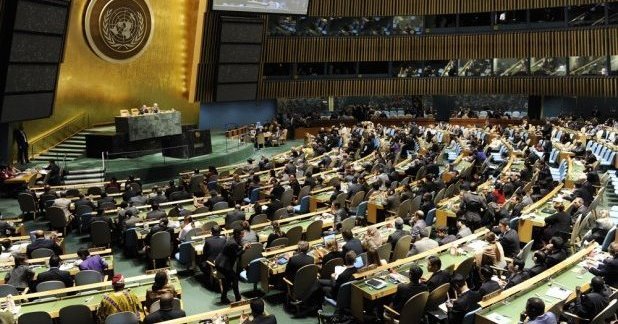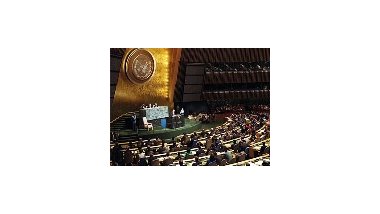From now on Germany has a say in the UN Security Council, increasing its influence in the world. Guido Westerwelle, Minister for Foreign Affairs and his delegation successfully argued that Germany deserves to be elected to a seat on the Security Council since it is the third biggest financial contributor of the UN.
Blocking reforms
What seems to be good news turns out to be a disappointment adopting a European perspective. The UN is still largely based on power relations of the world in 1945, characterised by World War II and Nationalism. In 2010 this is clearly anachronistic and in urgent need for reform.
After eighteen years the EU still doesn’t manage to act like an entity which would significantly increase it’s influence in the world.
Except for the four permanent members of the Security Council, all other members of the UN are demanding restructuring, especially the G-4 group: Germany, Brazil, India and Japan. Four countries promoting progressive change across continental borders? Unfortunately not! What the G-4 asks for is nothing but an extension of the term for non-permanent members to fifteen years. It would be a mere understatement to call this reform proposal conservative since the world has witnessed enormous changes.
Whereas former heavyweights are loosing ground, small countries seem to gain in importance as long as they manage to speak with one voice. The Union of South American Nations is one example, but attempts to gain more influence are also evident in Africa and Asia.
The German point of view
Germany officially claims to pursue a two-fold strategy: Requesting a permanent seat of its own as well as an additional seat for the EU perspectively. An explanation of why Germany doesn’t call for a permanent EU seat directly can be found on the homepage of the Foreign Office, stating that:
1. the EU’s Foreign Policy is not yet fully developed;
2. according to the Charter of the UN, international organisations don’t have the right to claim a seat.
This seems to be quite an evasive argument considering the potential political influence of the EU. If the member states would really like to talk with one voice, they were to succeed eventually. What’s missing is the willingness to put on some more pressure.
Europe’s role in the world
Westerwelle’s statement that there are profits for the entire EU does only cause irritation. After eighteen years the EU still doesn’t manage to act like an entity which would significantly increase its influence in the world. With a population of 500 million people, a gross domestic product of more than 18 billion US-Dollar and the second biggest military budget worldwide, the EU could be one of the most important actors on the world stage. Common economic interests could be represented and European values collectively defended: Democracy and human rights should not be taken for granted. These values are actually to be fostered by the UN, but experience has shown that the organisation didn’t always live up to expectations. National interests of the member states have too much an influence on decision-making processes which is illustrated by the current discussion about reforms.
Instead of European member states voting against each other in the UN Security Council, a strong and united Europe promoting and demanding the values of enlightenment is needed.
Interview Westerwelle
German and English, © UN



Follow the comments: |
|
